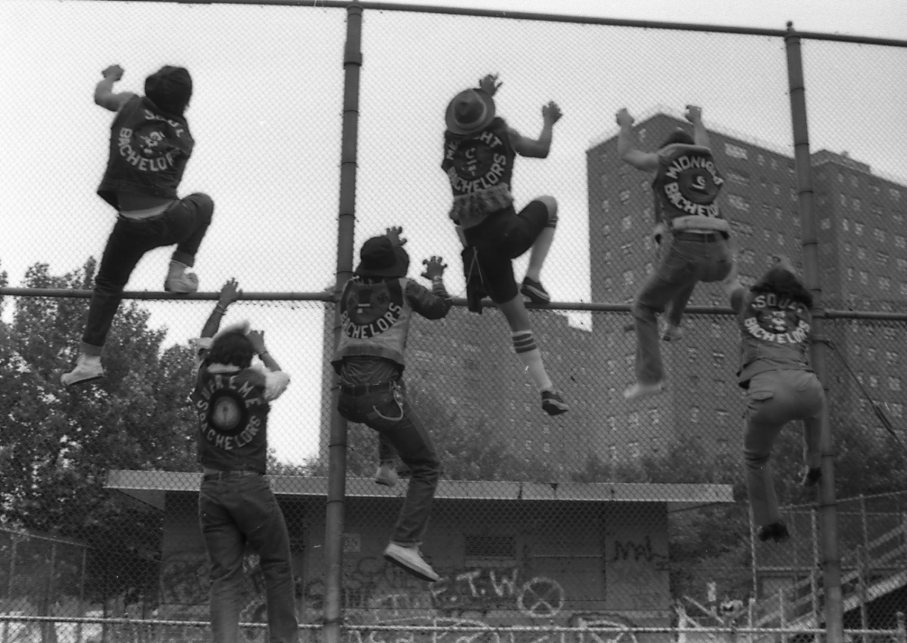Screening and Venue:
Sunday, Nov. 16, 9:15 PM at SVA Theatre
NORTH AMERICAN PREMIERE
Its simple to think that the “Bronx is burning” and other negative interpretations of New York City’s most notorious borough are accurate without understanding why that may have been and how the stigma of urban decay affected the people within. 1970’s New York City was indeed a dangerous place, plagued with the failure of government-led urban renewal, a relative failure of the civil rights movement, a serious lacking of gender and sexual rights, and hard drugs becoming more of an everyday reality. Yet out of all that, the despondency of the young people within led them to take a ferocious control of their destinies and form extended family bonds beyond those that may have barely existed at home.
With hypnotic archival news footage and a vast array of modern-day interviews from former gang members, Shan Nicholson’s Rubble Kings explores how these Latino and African-American teenagers (and White teens in the North Bronx) used ‘outlaw culture’ to violently take over the streets of 1970s New York. Gang membership estimated in the tens of thousands throughout NYC’s boroughs with names like the Harlem Turks, the Dirty Ones, and Dynamite Brothers. Gang culture’s epicenter, the South Bronx, became a literal war zone ruled by gangs like the Black Spades, Savage Skulls, the Turbans, and Roman Kings, to name only a few. As one young man from an archival interview says, “I seen 357’s, I seen 12 gauge shotguns. I seen dynamite on the streets. I seen all of this…Pretty soon they gon steal the damn atom bomb.” But it would the Ghetto Brothers, one of the original and largest of the gangs – that would have the most influence on them all and who would negotiate peace among the myriad gangs before the violence could reach a fever pitch.
The Ghetto Brothers, with founder ‘Yello” Benji Melendez and president Carlos ‘Karate Charlie’ Suarez providing the brunt of the context for the documentary, were a gang but operated more like an organization. Yes, they had their turf and defended it, but they did not believe in violence as a first resort, but reason. Benji even began ‘The Ghetto Brothers’ band and they held concerts all around the Bronx that were safe havens for all the gangs to unite and enjoy each others company within the community – a truly novel thing at the time and the impetus for deejay’s and MC’s like Kool Herc and Afrika Bambaataa to create what would become hip-hop, with young men and women replacing street violence with rhyme, dance, and deejay challenges.
Benji’s lust for life, community, and family is infectious and focuses the viewer into fully realizing the mindset of the youth of that time. While these gang members indeed wanted to shock society and had something to raise hell against, when the time came to tame it back, they did. Much like now with the civil unrest in Ferguson, Missouri and other parts of the country, while many people are doing work to make a difference it will be the youth – the next generation – who will lead the emotional charge for necessary change. As it should be.
Expected to attend the November 16th DOC NYC screening: director Shan Nicholson, producer Jim Carrey, executive producers Nick Quested and David Kennedy, producers Michael Aguilar, Cristina Esteras and Dito Montiel, film subjects Benji Melendez, Lloyd Murphy, Jee Sanchez, Rolly Rodriguez and D.S.R.
Rubble Kings screens with Fraser Munden & Neil Rathbone’s short film The Chaperone, an action-packed, animated retelling of what happened when a drunken motorcycle gang invaded a 1970s school dance.
This film is co-presented by Cinema Tropical. For a full schedule of films visit www.docnyc.net
RUBBLE KINGS – TEASER from shan nicholson on Vimeo.
On Twitter: @rubblekings
On Facebook: https://www.facebook.com/rubblekings
Director: SHAN NICHOLSON
Producer: Michael Aguilar, Dito Montiel, Jim Carrey, Shan Nicholson, Ben Velez, Cristina Esteras
Cinematographer: Dan Ribaudo & Sholmo Godder
Editor: Shan Nicholson
Music: Torbitt Schwartz
Running Time: 68
Language: English
Country: USA



